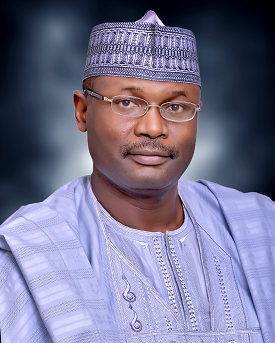The Independent National Electoral Commission (INEC) has officially begun implementing reforms based on the recommendations from stakeholders after the 2023 general elections. This move is part of a comprehensive effort to strengthen Nigeria’s electoral system and improve the quality of future elections.
In a meeting on Tuesday with the new European Union Ambassador to Nigeria and ECOWAS, Gautier Mignot, INEC Chairman Prof. Mahmood Yakubu provided an update on the commission’s progress, sharing that the body has already set the wheels in motion to address various concerns raised by local and international observers during the elections.
According to Yakubu, the 2023 general elections had brought about extensive feedback from 206 national and foreign observer groups, including the European Union Election Observation Mission (EU-EOM). These reports highlighted areas where improvements were needed. “The EU-EOM has made 23 recommendations, eight of which are actionable by INEC,” Yakubu said, noting that the other 15 recommendations involved broader stakeholders such as the judiciary, legislature, political parties, and civil society organizations.
One of the central areas of focus for INEC’s reform efforts is the updating of its planning tools, including the Strategic Plan and the Election Project Plan. This, Yakubu said, would ensure that future elections are more efficient, transparent, and reflective of international best practices.
The INEC Chairman stressed that the commission had already begun addressing several of the immediate recommendations, particularly those requiring administrative changes. These efforts include improvements to the training of election staff, enhanced deployment of Biometric Voter Accreditation Systems (BVAS), and more efficient management of election results. “In our recent bye-elections and reruns, we’ve seen marked improvements in training, and the BVAS machines are now more reliable, speeding up the results process,” Yakubu explained.
He pointed to recent successes, such as improved voter registration in Edo and Ondo states, as proof that the reforms were already taking effect. In the Ondo State governorship election, logistics issues—long a challenge in Nigerian elections—were more effectively addressed, with 80 percent of Permanent Voter Cards (PVCs) being successfully collected by eligible voters.
Yakubu also mentioned that INEC had taken steps to involve marginalized groups and internally displaced persons (IDPs) in the electoral process, a critical recommendation that had been highlighted by various stakeholders. These actions are intended to create a more inclusive and accessible election system, allowing more Nigerians to participate in the democratic process.
One of the key aspects of the election review has been the establishment of a robust results management system, which Yakubu said has been enhanced by the improved functionality of BVAS. This system has enabled faster and more accurate upload of election results to the INEC Results Viewing Portal (IReV), ensuring greater transparency in the election process.
The commission has also paid attention to voter registration and the ongoing cleanup of the voter’s register. Yakubu noted that INEC had made progress in making the register more accurate, which would reduce issues of ineligible voters casting ballots in future elections.
INEC’s collaboration with international partners such as the European Union (EU) has also played a key role in driving the ongoing reforms. Ambassador Mignot, in his remarks, reaffirmed the EU’s commitment to Nigeria’s democratic process, while stressing the importance of neutrality in the EU’s involvement. “We are not here to interfere in Nigeria’s political life. Our focus is on offering technical assistance, sharing best practices, and learning from Nigeria’s unique political and electoral context,” Mignot said.
The EU has committed €19 million to support the development of Nigeria’s electoral process, through the European Union-Support to Democratic Governance in Nigeria (EU-SDGN). This initiative aims to provide both financial support and expertise to INEC, helping the commission strengthen its operational capacity and maintain the credibility of Nigeria’s elections. The €19 million funding is part of a larger framework that includes sharing technical knowledge and offering assistance on election-day logistics and planning.
Yakubu clarified during the meeting that INEC’s funding arrangements with international partners are not direct, but instead focus on specific areas such as training, stakeholder engagement, and consultancy. “INEC does not receive direct funding for core electoral activities, such as voter registration or the production of PVCs. Those responsibilities remain solely with the Federal Government,” Yakubu stated.
Despite the support from the EU and other international organizations, Yakubu stressed that Nigeria’s electoral process must ultimately be a sovereign responsibility, and that INEC will continue to work within its mandate to uphold the integrity of the country’s democracy.
“We are grateful for the EU’s support, but Nigeria remains fully in control of its election process,” Yakubu emphasized, underlining that the federal government continues to manage the core aspects of the electoral system, including the provision of funding for sensitive materials and the training of ad hoc election staff.
The INEC Chairman also mentioned that the upcoming mid-term mission by the EU would provide an opportunity for a thorough review of the progress made on the 2023 EU-EOM recommendations. This, he noted, would further enhance the dialogue between INEC and its international partners, ensuring that Nigeria’s elections continue to evolve in line with global best practices.
The path towards electoral reform is expected to be a lengthy one, but Yakubu remains confident that the ongoing efforts will bear fruit. He concluded, “We are committed to improving every facet of Nigeria’s election process. With the continued collaboration of stakeholders like the EU, we are determined to build a system that the Nigerian people can trust and believe in.”
As INEC continues its work on implementing the recommendations of the 2023 elections, Nigerians can expect a more streamlined, efficient, and inclusive electoral system in the years to come.

